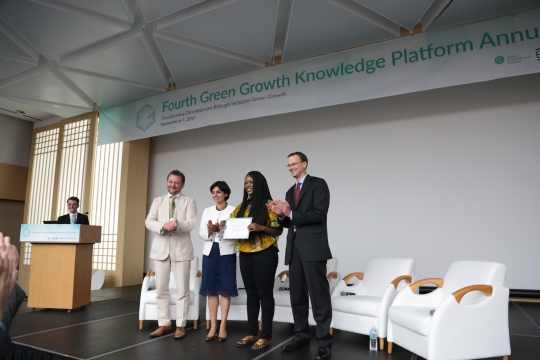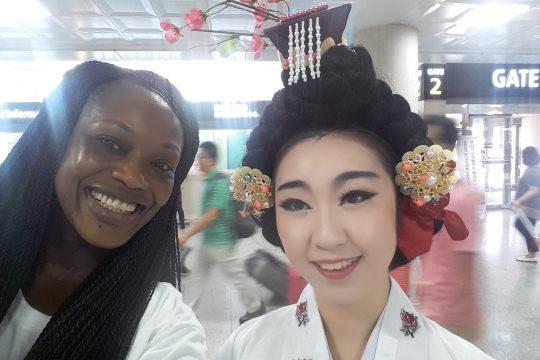Dr Byela Tibesigwa, of EfD Tanzania, was awarded best research paper during the closing ceremony at the GGKP annual conference that took place September 6-7, Jeju Island , Republic of Korea.
ByelaTibesigwa presented the award-winning paper ” Small-holder farming, food security and climate change in South Africa: Male-female and urban-rural differences” co-authored with Martine Visser during the session on " Ensuring gender-balanced participation and empowerment"
BRIEFLY DESCRIBE THE TOPIC AND CONCLUSION OF YOUR PAPER
This study set out to explore the gender effects of head of household on food security of small-scale farm households in rural and urban areas. Our results show that climate effects on food security are more apparent in rural than in urban areas. Male-headed small-scale farm households are more food secure than female-headed households. The food security gap between male- and female-headed households is higher in rural than in urban areas. Households in rural areas are more likely to report chronic food insecurity than are those in urban areas. However, in urban areas chronic food insecurity refers to having less than adequate food and the experience of hunger. Female headed-households depend more on agriculture for household food than male headed-household
THROUGH YOUR RESEARCH, WHAT DO YOU FIND AS THE ROLE FOR INCLUSIVENESS IN THE TRANSITION TO A GREEN ECONOMY?
Inclusiveness has a big role to play in green economy. The research points to the inclusion of gender dynamics in green economy.
WHAT ARE THE KEY POLICY IMPLICATIONS OF YOUR RESEARCH?
Our results support the growing interest of promoting rural agriculture and development. This is because it appears that agriculture contributes more to food security in rural than in urban areas, and this is more distinct amongst female-headed households. However, because agriculture also contributes to household food security in urban areas, urban agriculture should continue to be emphasised, in light of the effects of climate change on agriculture productivity and rural-urban migration.
WHAT ARE THE NEXT STEPS FOR YOUR RESEARCH?
I want to continue my gender work in Tanzania. South Africa and Tanzania have different economies hence I am interested in exploring my research further in a resource-constraint country like Tanzania. My next move is to come up with some potential solutions to the current gender problems I have been addressing.
HOW HAS THE GGKP CONFERENCE AND GLOBAL GREEN GROWTH WEEK BEEN USEFUL FOR YOU?
The conference correlates well with my research work and my passion about addressing the many sustainable development challenging in Tanzania, and in sub-Saharan Africa in general. My expectation on the conference was to interact with people from various developing countries, outside sub-Saharan Africa such as Mexico and Mongolia, with the hope of learning from their country experiences and hoping that in turn they will learn from my work in sub-Saharan Africa. But it is also important for me to learn from other developed regions as well. I have particularly enjoyed the part of the program that related to water and gender which are some of the key challenges in Tanzania.

